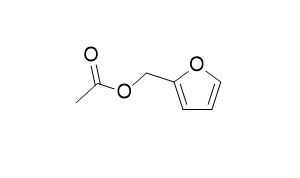Furfuryl acetate
Furfuryl acetate is a volatile flavor compound.
Inquire / Order:
manager@chemfaces.com
Technical Inquiries:
service@chemfaces.com
Tel:
+86-27-84237783
Fax:
+86-27-84254680
Address:
1 Building, No. 83, CheCheng Rd., Wuhan Economic and Technological Development Zone, Wuhan, Hubei 430056, PRC
Providing storage is as stated on the product vial and the vial is kept tightly sealed, the product can be stored for up to
24 months(2-8C).
Wherever possible, you should prepare and use solutions on the same day. However, if you need to make up stock solutions in advance, we recommend that you store the solution as aliquots in tightly sealed vials at -20C. Generally, these will be useable for up to two weeks. Before use, and prior to opening the vial we recommend that you allow your product to equilibrate to room temperature for at least 1 hour.
Need more advice on solubility, usage and handling? Please email to: service@chemfaces.com
The packaging of the product may have turned upside down during transportation, resulting in the natural compounds adhering to the neck or cap of the vial. take the vial out of its packaging and gently shake to let the compounds fall to the bottom of the vial. for liquid products, centrifuge at 200-500 RPM to gather the liquid at the bottom of the vial. try to avoid loss or contamination during handling.
Korean J. Food Preserv. 2021, 28(6):846-856.
Toxicol In Vitro.2024, 99:105876.
Agronomy 2021, 11(3),502.
Molecules.2023, 28(2):727.
Adaptive Medicine 2020, 12(1): 4-10
Food Chem X.2024, 24:101909.
South African J of Plant&Soil2018, 29-32
Sci Rep.2024, 14(1):31213.
Biochem Biophys Res Commun.2018, 505(1):194-200
Korean Herb. Med. Inf. 2016, 4(1):35-42
Related and Featured Products
Enzyme and Microbial Technology, 2015, 84:1-10.
Kinetic modeling and docking study of immobilized lipase catalyzed synthesis of furfuryl acetate.[Reference:
WebLink]
The present work deals with the kinetic modeling and docking study for the Furfuryl acetate synthesis using immobilized Burkholderia cepacia (BCL) lipase.
METHODS AND RESULTS:
Initially various lipases were immobilized on hydroxypropyl methyl cellulose (HPMC) and poly vinyl alcohol (PVA) base hybrid polymer matrix. After screening of various immobilized biocatalysts, HPMC:PVA:BCL was found to be a robust biocatalyst. Various reaction conditions were optimized using response surface methodology (RSM) based on a four-factor-three-level Box–Behnken design. The optimal conditions were obtained at molar ratio of 1:2 of furfuryl alcohol to acyl donor, temperature 50 °C with catalyst loading of 30 mg in 3 mL of non-aqueous media toluene. Under these conditions 99.98% yield was obtained in 3 h. The Arrhenius plot showed that the activation energy for Furfuryl acetate synthesis was 10.68 kcal/mol. The kinetics of reaction was studied close to optimized conditions which obey order bi–bi model. Molecular docking study was carried out to understand the active site of BCL which is responsible for the reaction.
CONCLUSIONS:
It was observed that the reaction proceeds via acylation of the active serine of BCL and demonstrating strong hydrogen bond between the substrate and histidine site. The catalyst recyclability study was carried up to five cycles.
Chromatographia, 1989, 28(7-8):405-411.
A simple method for concentrating volatile flavor compounds in aqueous systems using RP-HPLC.[Reference:
WebLink]
METHODS AND RESULTS:
Volatile flavor compounds in aqueous model systems, distillates of coffee extract and juices such as apple, tomato, pineapple and grape were adsorbed on an ODS column during HPLC and monitoring absorption at 280 nm. The adsorbed volatile compounds were eluted with a small volume of ethanol. Volatile compounds in the eluates were concentrated 22 to 100 times those in the distillates. Recovery of compounds was 50-90%. Breakthrough of specific compounds such as .gamma.-valerolactone, Furfuryl acetate and t-2-hexenal in the model systems and several compounds in the juice distillates was detected by capillary GC. Pattern similarity calculated between the GC profiles of a juice distillate and the corresponding eluate gave a qualitative comparison.
CONCLUSIONS:
This novel and versatile method utilizing conventional RP-HPLC may be widely applicable for concentrating volatiles in aqueous systems, at levels from ppm to ppb.



